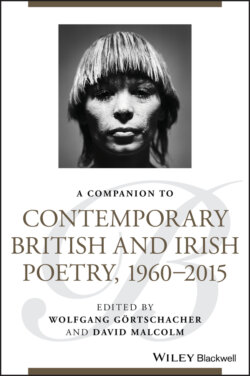Читать книгу A Companion to Contemporary British and Irish Poetry, 1960 - 2015 - Группа авторов - Страница 19
Geoffrey Hill, “Mercian Hymns XXV” (1971) (Hill 2006, 85)
ОглавлениеMercian Hymns consists of 30 short prose poems. They center on the person and deeds of the historical, but almost legendary, Anglo‐Saxon king Offa, on the childhood of the modern speaker, and on the experiences of his relatives in the semi‐industrial past. These are connected by motifs of digging and lost and recovered artifacts, by physical history, by memory, and by cruelty and suffering. Hymn xxv contains no reference to Offa, but it belongs wholly within the collection because it involves a recovery of the fragmented past.
The poem is neatly ordered into an opening and a closing stanza (which are precisely the same text), which bracket two stanzas amplifying the material in the first and last. The opening and closing stanzas have a liturgical and solemn, declamatory quality: “I speak this in memory.” It has an appropriate formality of lexis—“childhood and prime womanhood”—although this is, to some extent, offset by the dialect (but also archaic) word “darg.” It is also spoken in the present, in memory of the speaker's grandmother, and by someone who is able to brood on Ruskin's Fors Clavigera (although the letters therein were directed to working men).
The two central stanzas expand on the “nailer's darg” mentioned in lines 1 and 4. Although the grandmother is not directly present, the “nailshop” is, with its smell and its dust. The workshop is strangely static; in view are the effects of labor, oddly pretty (“damson‐bloom”) and fatal and terrible (“hare‐lipped by the searing wire”). An elliptical narrative is embedded in these stanzas, implying an accident during work there. One assumes the grandmother is involved, most likely as someone attempting to care for a mutilated family member or fellow worker. The “posthumous clamour” suggests a fatal accident. As in the enfolding stanzas, language is mixed: “back of the cottage” is informal and regional; “posthumous clamour” is formal and Latinate. Ruskin, too—and hence an educated and metropolitan world—is present in the “quick forge” in stanza 3.
As with all the hymns, stanzas are interwoven by patterns of phonology: /m/ and /s/ sounds in stanzas 1 and 4, /s/ structures stanzas 2 and 3 also, as do a harsh /k/ and softer /d/, /t/, and /e&ip.iscp; / in “cradle a face hare‐lipped.”
The point of the text is to revise a metropolitan and intellectual (if well‐meaning) view of the world of manual labor. “Darg” is a harsh word for unremitting work. In a miracle of elliptical coherence, Hill brings together the present and the past, and an intellectual world and a world of labor. The hidden savagery of a West Midlands (Offa's kingdom lay there), small‐scale, semi‐industrial nailshop is linked to the cruelties of an Anglo‐Saxon kingdom. Both must be excavated. Memory and artifact are similarly fragments of a vital but vanished past. There is a stubborn insistence on their value. All this is woven together by recurrent motif and a web of sound effects.
